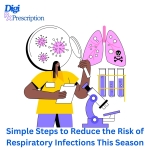
Simple Steps to Reduce the Risk of Respiratory Infections This Season
As the seasons change, respiratory infections like colds, flu, and other viruses, such as RSV and HMPV, tend to become more prevalent. Protecting yourself and your loved ones from these infections requires a proactive approach. Fortunately, a few simple, everyday practices can significantly reduce the risk of getting sick.
1. Maintain Proper Hand Hygiene
Regular handwashing is one of the most effective ways to prevent respiratory infections.
- Wash your hands with soap and water for at least 20 seconds, especially after being in public places, coughing, or sneezing.
- If soap and water aren’t available, use an alcohol-based hand sanitizer with at least 60% alcohol.
2. Avoid Touching Your Face
Viruses that cause respiratory infections often enter the body through the eyes, nose, or mouth.
- Avoid touching your face, especially if you’ve come into contact with surfaces that might be contaminated.
3. Keep Your Distance
Respiratory infections spread easily in crowded areas through respiratory droplets.
- Avoid close contact with people who are sick.
- Maintain at least 3 feet of distance in crowded settings, especially during peak infection seasons.
4. Cover Coughs and Sneezes
Proper respiratory etiquette helps reduce the spread of germs.
- Always cover your mouth and nose with a tissue or your elbow when you cough or sneeze.
- Dispose of tissues immediately and wash your hands afterward.
5. Wear a Mask in High-Risk Settings
Wearing a mask in crowded or poorly ventilated areas can help protect against respiratory droplets carrying viruses.
- This is especially important for high-risk groups such as older adults, young children, or those with chronic illnesses.
6. Clean and Disinfect Frequently Touched Surfaces
Viruses can survive on surfaces for hours, sometimes even days.
- Regularly disinfect surfaces like door handles, light switches, keyboards, and phones using a household disinfectant.
- Pay special attention to shared spaces like kitchens and bathrooms.
7. Stay Up to Date with Vaccinations
Vaccinations can reduce the severity and spread of certain respiratory infections.
- Get your seasonal flu shot.
- For those eligible, consider other vaccines such as pneumococcal and COVID-19 boosters.
8. Strengthen Your Immune System
A strong immune system is your best defense against respiratory infections.
- Eat a balanced diet rich in fruits, vegetables, lean proteins, and whole grains.
- Stay hydrated by drinking plenty of water.
- Get at least 7–8 hours of sleep each night.
- Exercise regularly to maintain overall health.
9. Stay Home if You’re Sick
If you experience symptoms like fever, cough, or shortness of breath, it’s important to rest and avoid contact with others.
- Seek medical attention if your symptoms worsen or don’t improve.
- Protect others by staying home until you’re no longer contagious.
10. Use Technology for Virtual Consultations
Telemedicine offers a convenient way to consult with doctors without visiting a clinic in person.
- Schedule virtual appointments for minor illnesses to avoid unnecessary exposure to germs.
- Many digital healthcare tools allow you to access prescriptions and advice remotely.
11. Monitor Air Quality and Ventilation
Good indoor air quality reduces the risk of respiratory infections.
- Use air purifiers to filter out allergens and germs.
- Ensure proper ventilation by opening windows and using exhaust fans.
Conclusion
Taking these simple steps can go a long way in reducing your risk of respiratory infections this season. By focusing on hygiene, vaccinations, and healthy habits, you can protect yourself and those around you. Small, consistent changes in your daily routine can make a big difference in staying healthy all year round.
